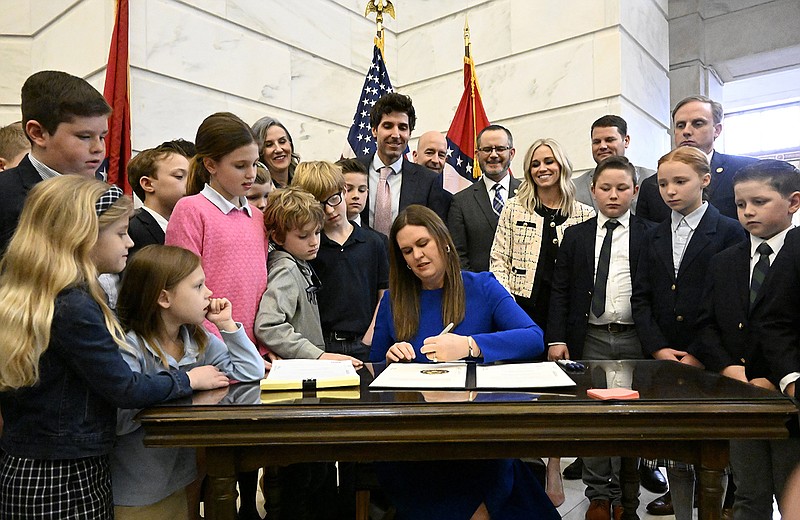While Gov. Sarah Huckabee Sanders signed the LEARNS Act, her signature education overhaul, into law almost two months ago, what the legislation will look like in practice is yet to be determined.
The law's voucher program, which will allow parents to use state dollars earmarked for public schools to send their children to a private or home school, will be governed by a set of rules state educational officials will write this summer.
Private school administrators, home school parents and public education advocates said they will be watching.
Some private school officials say the fewer rules, the better. Critics, meanwhile, will push for more oversight.
"For us, the main thing we are waiting for is to find out what exactly are the requirements for us to participate," said Bryan Easley, head of school at Ridgefield Christian School in Jonesboro.
During a town hall in Texarkana on Tuesday, Sanders said there will be an "accountability mechanism" for private and home schools that participate in the LEARNS Act's voucher program, also known as educational freedom accounts. But the law has few details on what rules schools and parents will have to follow.
"Frankly one of the challenges with [the] LEARNS [Act] is it has just so much rulemaking, just mountains and mountains of bureaucracy that need to be created to administer the program," said Bill Kopsky, executive director of the Arkansas Public Policy Panel.
Kopsky, a critic of vouchers, said he is worried the Department of Education will rush through the rulemaking process to make the voucher program ready for the start of the next school year.
Under the program, students will receive 90% of the per-pupil foundation funding public schools receive from the state, which will be $6,856 for the 2023-2024 school year. The program will be phased in over three years, with students enrolled at F-rated schools, kindergarten or a foster care program or who have a disability or active-duty military parent being eligible for the 2023-24 school year.
For the 2024-25 school year, priority will next be given to students who are enrolled in a D-rated school or have a parent who is a military veteran or first-responder. By the 2025-26 school year, each student who is eligible to enroll in a public school will be eligible for a voucher to attend private or home school.
According to an estimate from the Department of Education, the educational freedom accounts will cost the state $46.7 million in the first year and $97.5 in the second.
This week, the Arkansas Department of Education will announce the makeup of a series of working groups that will provide the department with advice as it starts the rulemaking process around the LEARNS Act.
LEARNS stands for literacy, empowerment, accountability, readiness, networking and safety.
The law requires private and home schools that accept vouchers to administer a test pre-approved by the Education Department. Schools that accept vouchers may also be subject to a random audit by state officials. For many private schools, administering a test is not a major ask as many already are required to do so to gain accreditation from the Arkansas Nonpublic School Accrediting Association.
Kopsky said his group will push for more oversight of schools that accept vouchers, but admitted it will likely be an uphill battle.
"Our view is that public tax dollars should come with public accountability, Kopsky said. "They should follow the same rules that any traditional public school should follow."
Any potential regulation could be a concern for some private schools, Easley said. He said he did not want his school to become dependent on vouchers funding a large portion of tuition revenue.
"Our present [gubernatorial] administration is very pro-family, I think, very pro-religious freedom," Easley said. "What happens three administrations down the road and there is a radical change in the philosophy?"
In response to a question about vouchers in Texarkana, Sanders said private schools do not have to partake in the program if they don't feel comfortable.
"It's not mandatory that anyone participate," Sanders said. "So if a home school family or a private school does not want to participate in the program, they don't have to."
Amanda Escue, executive director of Lighthouse, a home school cooperative and private school in northeast Arkansas, said she is not that concerned about heavy regulation. She said her school has participated in the Succeed Scholarship Program, a state-funded program for special needs students to attend private schools.
"We understand[the voucher program will] mirror what's been going on with the Succeed Scholarship," Escue said.
Among the rules regulating the scholarship program, private schools must show "fiscal soundness," administer a "nationally recognized, norm-referenced test," create progress reports for students and comply with federal civil-rights laws. The LEARNS Act repeals the law creating the program, giving all those who participate an educational freedom account instead.
For home school parents, what exactly they can spend voucher funds on and how they will receive the money to do so is an open question. Laurie Lee, chair of the pro-school choice Reform Alliance, said funds will likely be given to a third party rather than directly to a parent. The Reform Alliance manages the Succeed Scholarship Program, operating as a go-between for the state, parents and private schools.
The LEARNS Act allows for educational freedom accounts to be spent on "qualifying expenses," which include tuition, fees and school supplies, but how that will work, especially for home schools, is yet to be determined.
"The way that it works in many states is there is a portal, like an Amazon portal where there are approved items," Lee said.
